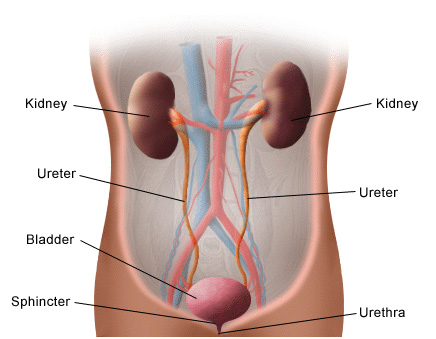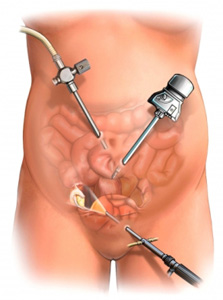
DR. VINAY MAHENDRA
Gall Bladder Cancer Surgeon in Kolkata, India
MS. Mch (Urol.), DBN (Urol.), FRCS (Glasg.) FRCS (Urol.) Senior Consultant Urologist
Laparoscopic And Robotic Urological Surgeon and Renal Transplant Surgeon
![]()
FOR APPOINTMENT CALL SECRETARY
+91 9830216715 (Secretary Amit Roychowdhury : 11:00 A.M. - 4:00 P.M.)
+91 9830492572 (Secretary, Dalia Chatterjee : 11:00 A.M. - 4:00 P.M.)
BLADDER CANCER ROBOTIC SURGERY
Robotic surgical systems have thrust minimally invasive surgical options into a new era. For years, surgeons and urologic oncologists have relied on the minimally invasive, nerve-sparing virtues of the procedure known as laparoscopic cystectomy to offer their patients the most effective treatment for bladder cancer. Not long ago, all cystectomies were performed using an open surgical procedure in which notable tissue and nerve damage, significant blood loss, and an increased risk of post-operative infections and complications were common.
Robotic cystectomy is simply a newer, more effective, minimally invasive surgical method for bladder cancer. This procedure utilizes the da Vinci Surgical System in which a robotic arm imitates the surgeonís movements, amplifying their precision. It offers bladder cancer patients the prospect of a more effective surgery and less problematic post-surgical recovery. It is fast becoming the preferred answer for bladder cancer surgery. This surgical procedure allows the surgeon to make smaller incisions which spare vital, but delicate, nerve and muscle tissue. The patient experiences a shorter hospital stay, fewer complications, and a faster recovery time.

Similar to a standard laparoscopic cystectomy, the robotic-assisted cystectomy may require a urinary diversion with subsequent reconstruction for the removed bladder. For men and women alike, such reconstruction would include a continence reservoir which holds urine in the abdominal cavity until the patient has been fitted with a catheter to empty urine or a bladder replacement and an external bag for urine collection. The da Vinci Surgical System provides the physician with a superior visualization plane and improved surgical dexterity during bladder removal and, if necessary, a reconstructive procedure.
By offering the surgeon, urologist or oncologist a high-definition 3-D view, the da Vinci surgical robot distinguishes the vital muscles and delicate nerve tissues surrounding the operative area, providing the opportunity to preserve them. The robotís unique EndoWrist instruments offer physicians the dexterity not available to them when using conventional laparoscopic instruments. By taking advantage of the da Vinci robot, surgeons are able to dissect and reconstruct the bladder with relative ease.
Summary of Robotic-Assisted Cystectomy
• Designed to spare delicate nerve and muscle tissue.
• Keyhole-sized incisions distributed across the abdomen.
• A brief 4 to 7 day hospital stay.
• Less risk of blood loss and a lower chance of needing a blood transfusion.
• Reduced scarring, minimal discomfort, and less need for major pain medication.

Only one to three month's period of recovery before regaining a normal level of urine control.
Cancers of the bladder are usually diagnosed by examining urine for cancer cells under a microscope (known as urine cytology) or during cystoscopy, an inspection of the bladder by inserting a slender tube equipped with a lens and a light through the urethra up to the bladder.
Benefits of Robotic-Assisted Cystectomy
• Minimal damage to vital muscle and delicate nerve tissue as a result of the surgery.
• A shorter hospital stay and an even faster return to a normal level of activity.
• Fewer noticeable scars.
• Minimized risk of blood loss.
• Minimized chances of post-operative infections.
• Minimized chances of post-operative incontinence or impotence.
• Minimized chances of other complications commonly associated with cystectomy.
• Minimal post-operative pain and discomfort.
• The unprecedented technology of the da Vinci Surgical System which offer surgeons, oncologists and urologists a high-definition, three-dimensional view of the procedure, as well as the assistance of the robot in suturing.
Typical Open Surgical Cystectomy
• Greater risks associated with any procedure that requires a large surgical incision.
• Potentially greater discomfort and longer post-operative hospital stay.
• Potentially more postoperative scarring, muscle and nerve damage.
• Potentially more postoperative soreness and a greater need for prescription pain medication.
• Longer post-operative recovery time.

It's helpful to know that patients who've had open surgery can experience five times the blood loss, four times the risk of other complications, an increased chance of infection, incontinence, and/or impotence, and roughly three times the hospital stay as patients who opt for robotic-assisted surgery.
Robotic-assisted cystectomy offers patients a 14% higher cancer removal rate compared to traditional surgery. The da Vinci procedure improves the chances of re-establishing normal sexual activity in as little as 11 months.
UROLOGICAL APPLICATION
DR. VINAY MAHENDRA
MS. Mch (Urol.), DBN (Urol.), FRCS (Glasg.) FRCS (Urol.) Senior Consultant Urologist Laparoscopic And Robotic Urological Surgeon and Renal Transplant Surgeon
ADDRESS:
Apollo Multispeciality Hospitals
58, Canal Circular Road, Kolkata - 700054, West Bengal. India.
FOR APPOINTMENT CALL SECRETARY :
+91 9830216715
(Secretary Amit Roychowdhury : 11:00 A.M. - 4:00 P.M.)
+91 9830492572
(Secretary, Dalia Chatterjee : 11:00 A.M. - 4:00 P.M.)
E-MAIL :
drmahendraappointments@roboticsurgerykolkata.com
WEBSITE :
www.roboticsurgerykolkata.com
POWERED BY :
www.calcuttayellowpages.com